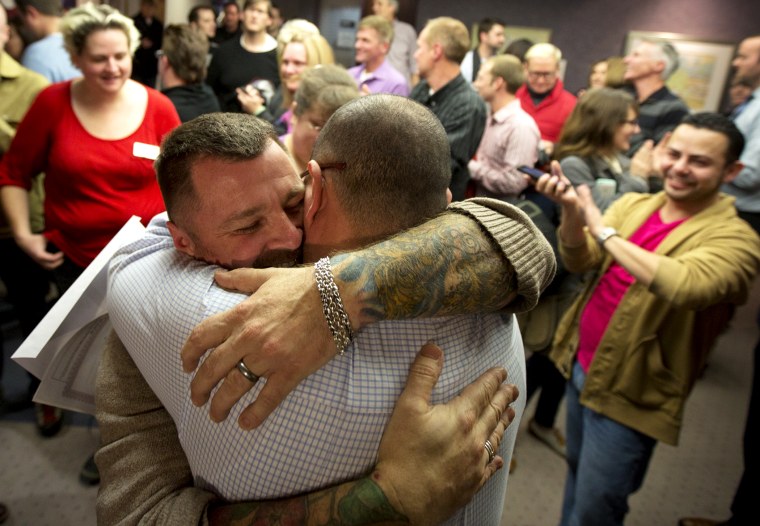A federal judge in Utah declared the state’s ban on same-sex marriage unconstitutional on Friday, clearing the way for the home of the Mormon church to potentially become the 18th state in the U.S. to legalize marriage equality. Officials in Salt Lake County began issuing marriage licenses to same-sex couples.
District Judge Robert J. Shelby, an Obama appointee who was confirmed by the Senate last year, ruled that Utah’s marriage laws violated the U.S. Constitution’s guarantee of due process and equal protection under the 14th Amendment. Utah voters passed a ban on same-sex marriage with 66% approval in 2004, the same year Massachusetts became the first state in the U.S. to permit same-sex nuptials.
"The state’s current laws deny its gay and lesbian citizens their fundamental right to marry and, in so doing, demean the dignity of these same-sex couples for no rational reason," wrote Shelby in his 53-page opinion. "Accordingly, the court finds that these laws are unconstitutional."
The decision comes 16 days after Shelby heard oral argument in the case brought by three gay couples. State attorneys defended the ban, arguing it promoted Utah’s interest in “responsible procreation” and the “optimal mode of child-rearing.”
But Shelby said the state “provided no evidence that opposite-sex marriage will be affected in any way by same-sex marriage,” and that “in the absence of such evidence, the state’s unsupported fears and speculations are insufficient to justify the state’s refusal to dignify the family relationships of its gay and lesbian citizens.”
Shelby did not issue a delay on the effect of his decision, but if the state decides to pursue an appeal, it will likely seek a stay on Friday’s ruling.
Utah’s is one of more than 40 court challenges to same-sex marriage bans in 22 states, according to the Associated Press, and carries symbolic weight in a rapidly shifting dialogue on marriage equality. The Church of Jesus Christ of Latter-day Saints, based in Utah, played an instrumental role in helping California pass Proposition 8, the 2008 ban on same-sex marriage that was allowed to fall in June by a U.S. Supreme Court ruling. Utah was also one of the first states to pass its own ban on same-sex marriage four years earlier.
Shelby's decision comes one day after New Mexico’s state Supreme Court unanimously ruled to allow gay couples to marry in that state. Gay rights advocates are hailing the momentous progress marriage equality has made this year.
"Utah's ruling, which comes after the so-called 'Defense of Marriage Act' was ruled unconstitutional, makes it the 9th state to pass marriage equality in 2013 alone," said Wilson Cruz, GLAAD's national spokesperson, in a statement. "We are seeing state leaders and more and more citizens recognize that loving and committed couples should not be legally kept apart. We look forward to seeing that momentum continue in 2014."
